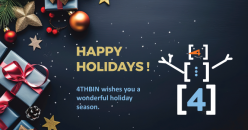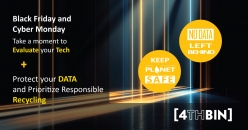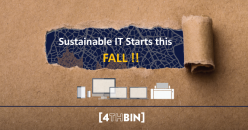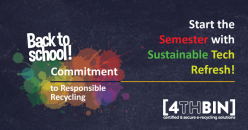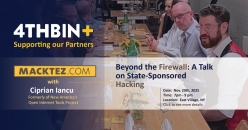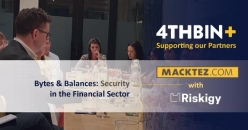Q&A with Justin Shnayder, NYC’s Young E-waste Activist, Taking Action and Driving Awareness
When you look around, you see a whole new generation of young environmental activists leading the charge to drive awareness and action. These courageous young men and women aren’t the stereotypical ‘tree hugger.’ Their message is about taking action today to save the environment for our own survival.
4THBIN is teaming up with one of New York City’s very own young environmental activist, Justin Shnayder, junior at Staten Island Technical High School and co-founder of the non-profit youth-led organization Erasing E-Waste. We sat down with Justin to share his story and what he has learned on his journey so far.
Q: Tell us a little bit about you and your organization?
A: I am a 16-year-old living on Staten Island and a junior at Staten Island Technical High School. I have been interested in environmental sustainability and advocacy for as long as I can remember, and I plan studying environmental science and materials engineering in college. Although I’m academically focused, pursuing my love for STEM through competitions like Science Olympiad, my desire to make a difference knows no bounds, and in the summer before eighth grade, I teamed up with a few friends of mine to organize an e-waste drive in our neighborhood to help our community recycle their obsolete electronics. Little did we know, our community event catalyzed a four-year long project that I aptly named “Erasing E-Waste.” It is our mission to not only serve as a conduit for accessible e-waste recycling services for New Yorkers, but also, to educate them on the e-waste crisis and how to dispose of it.
Q: What attracted you to this cause?
A: The story behind “Erasing E-Waste” is actually quite mundane. It begins with finals week in the seventh grade. While our minds were preoccupied with the impending disaster of taking the upcoming tests, our English teacher was preoccupied with a disaster of her own: her printer ran out of ink right when she was printing our exams! She mindlessly discarded the ink cartridge into the plastic recycling bin, scoffing when we asked if it belonged there. Returning home that day, I decided to google how to recycle ink cartridges, and my findings were shocking. I learned of the dangerous chemicals in electronics and how their improper disposal can contaminate soil, water reservoirs, and thus impact our own health. I ultimately embarked on a journey to ‘erase e-waste’ and address its harmful effects on the environment.
Q: How did you get started?
A: During the summer break right after seventh grade, I found that I had more free time, and started planning an e-waste collection event, the first major step on my journey to ‘erase e-waste.’ I had to choose a convenient location, and I had to decide how I was going to promote the event as well. I settled on hosting it right next to my neighborhood’s town hall, which was located close enough to everyone, and I was able to set up a table and a place to hold all of the collected electronics in advance. I then promoted the event during a neighborhood BBQ where I handed out flyers to all of the patrons. I also included an incentive - the person who recycles the largest amount of e-waste would win a $25 gift card! The turnout was impressive, and over 40 people contributed nearly 1,000 pounds of e-waste, which was absolutely incredible.
Q: What was most surprising to you when you started?
A: I was just shocked at the egregious e-waste recycling policies at stores like Staples and Best Buy that have strict limits on how much e-waste one family can bring in per day. At our first collection event, I was unable to partner with any other third-party organizations to recycle the waste, and had to transport all of the collected e-waste myself to the nearest stores that would accept them. I was disappointed to find out that many of these stores had policies that stated that one family can bring in only 3 items of e-waste to be recycled per day, which complicated my efforts. After making several rounds of delivering e-waste to Best Buy and Staples every day for two weeks, my father and I were finally able to recycle all of the e-waste from our very first collection event.
Q: What do you see as the biggest challenge and what are you doing to address it?
A: The biggest challenge is definitely the lack of awareness on the extent to which e-waste may impact people’s lives. Americans produce 77 pounds of e-waste annually, and the vast majority of this is exported to foreign dumping grounds rather than recycled. Most Americans do not realize that their prized cellphones and laptops are very harmful to the environment if disposed improperly, as they contain toxic chemicals like lead and mercury. In fact, less than half of Americans know what e-waste is, let alone how to recycle it. Thus, one of the focal points of our mission is to educate our community on exactly that: the nature of the e-waste crisis and how to dispose of e-waste properly. We hold educational sessions a few weeks before our collection events both in our school and at Town Hall meetings using interactive lessons. This way, the individuals that we reach will remember the importance of recycling their electronics.
Q: Do you collaborate with other schools or organizations to host your e-waste drives?
A: We have collaborated with a number of organizations and schools to host our e-waste drives. We’ve organized 5 thus far: 3 in my neighborhood, 1 in my school, and 1 during a summer camp. With the exception of our very first collection event, I worked with the NY Dept. of Sanitation to facilitate the recycling of all of the collected electronic waste. In the case of neighborhood-based collection events, I worked with the neighborhood homeowners association to get permission to host the events as well as to promote the event to community members. In the case of school events, I worked with the Coordinator of Student Activities (COSA) of Staten Island Technical High School to host the event, which required thorough planning and promotion. In the case of the summer STEM camp sponsored by Staten Island Technical High School, I worked with the summer camp participants and fellow counselors to achieve our goals. We have recently worked with the Warbler Organization, which specializes in environmental advocacy, to speak to an audience of over 100 teenagers interested in the subject to shed light on the e-waste crisis. We also worked with the environmental clubs of local schools to inform students about the e-waste dilemma.
Q: What do you think other people need to know about e-waste?
A: I think other people need to know about the fact that e-waste is very easy to dispose of, but can pose serious risks if it is disposed of improperly. Many people may delay recycling their obsolete electronics because they feel as if it would be a very arduous task. This cannot be farther from the truth, as there are multiple avenues of recycling electronics, whether that be through businesses specializing in that process, stores that accept recyclable electronics, or through government-sponsored recycling services. People feel as if simply throwing their e-waste into the trash won’t do much harm, but what they don’t know is that their phones and computers are composed of toxic chemicals, that if introduced into our environment, can contaminate water reservoirs, soil, and even the nearby air.
Q: What do you see as the next step for your organization?
A: Our organization has worked closely with the NY Department of Sanitation to host our e-waste drives. However, it was shuttered during the pandemic due to budget cuts. As a result, we are left without a third-party organization to actually recycle the e-waste. Our next steps are identifying third-party organizations that can fill the gap. In the meantime, we are developing a petition to urge our elected officials to reconsider the e-waste recycling program to be included in the budget for the upcoming fiscal year, as it is cheap, but nonetheless important for our city residents.
Q: Is there an achievement or contribution that you are most proud of?
A: One of the most exciting projects we have worked on over the past year was the development of our geo-spatial algorithm. After participating in an online bootcamp for programming in R, which specializes in statistical computing, we were able to create an algorithm that aggregates data from survey responses to generate a heatmap of where e-waste recycling is needed. We have a pool of about 500 people who fill out the survey monthly, and their responses are automatically entered into a google form that records non-identifying information (zip code and the amount of e-waste to be recycled, if any, in pounds). Our algorithm produces a new choropleth (or heat) map at the conclusion of every month, with red areas indicating zip codes with large amounts of e-waste to be recycled. Using publicly available map data, it then suggests areas to host e-waste drives (public parks near or in the red zones). This streamlines the entire process, allowing us to focus our attention on areas in critical need of recycling, which is especially important during the pandemic.
Q: How has this experience changed you?
A: This experience has taught me a number of things. First and foremost, it exposed the manners in which the e-waste crisis manifests itself in our lives on a daily basis. Moreover, I learned of the importance of collaboration and teamwork. I wouldn’t have been able to complete any of my projects without the crucial assistance of others. Whether that be working with school officials to execute our drives, getting permission to host e-waste drives in my neighborhood from my neighborhood HOA, or the Department of Sanitation recycling the collected electronics, I’ve received help I am forever in debt for. Additionally, my friends have been an integral part of Erasing E-Waste, I would like to thank Alexandra Shakhnazarov, who has served as co-executive director of the organization. She has used her experience in the field to help mobilize our school community to contribute to our drive both in person and virtually through social media.
Connect with Justin today on LinkedIn or visit his website Erasing E-Waste.

![4THBIN [News] Q&A with Justin Shnayder 4THBIN [News] Erasing Ewaste Justin Shnayder](/sites/default/files/news/2021-02/4-News-Erasing-Ewaste-JS_1.jpg)
